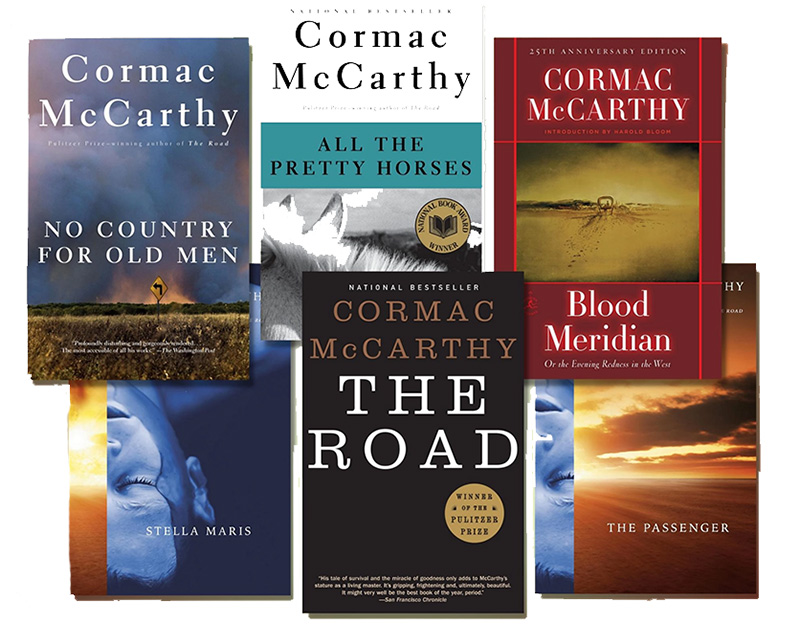
As I was writing this month’s blog, the news broke that the novelist Cormac McCarthy had died at the age of eighty-nine, and suddenly, I could not think of any other topic on which I wanted to write.
For many years, McCarthy bore the unofficial title of America’s Greatest Living Author. His reputation was founded on dark, often violent novels like All the Pretty Horses (1992), No Country for Old Men (2005), and The Road (2006), all of which have been adapted for film.
Get a free sample proofread and edit for your document.
Two professional proofreaders will proofread and edit your document.
The Road was selected for Oprah Winfrey’s Book Club, resulting in McCarthy’s only television interview, which is frankly astonishing given the author’s private nature. He rarely spoke about himself or his work, sometimes to his personal detriment; his second wife, Anne DeLisle, recalled that once, during a period of financial trouble, McCarthy turned down a lucrative speaking engagement because he felt that his books were self-explanatory.
Any reader who has been wrong-footed by McCarthy’s idiosyncratic modernism might dispute that claim. He often dispensed with commas and even apostrophes (e.g., rendering “can’t” and “won’t” as “cant” and “wont”) and eschewed quotation marks altogether, so that the voices of his characters merge with the observations of an omniscient narrator.
In his later novels set in the American southwest, McCarthy embraced a lean, declarative style, his English often carrying distinctive Spanish inflections, which, along with the use of archaic vocabulary and diction in historical works like his masterpiece Blood Meridian (1985), give his language a rich complexity and expressive power. His prose is dense, sometimes difficult, but deeply rewarding.
His move toward a sparser, simpler mode of expression brings us to the point where Cormac McCarthy’s career intersects with my own, and with my purpose in writing these blogs, because for almost thirty years, America’s Greatest Living Author also had a side gig as a proofreader.
After settling in New Mexico in the early 1990s, McCarthy took a volunteer position at the Santa Fe Institute (SFI), a multidisciplinary research center, where he worked with the academics and postdoctoral fellows in residence on revising their research papers, precisely the kind of thing that we at ProofreadingPal do every day. McCarthy was an educated layman with no particular scientific background. He brought to the position only (!) a love of good writing and an understanding that there is no scientific truth so profound that it cannot be improved by clear, strong prose. As he told SFI biologist Van Savage: “When you make your writing more lively and easier to understand, people will want to invest their time in reading your work.”
Scientific writing is notoriously difficult to read, even for other scientists. Some of this difficulty is inherent—of necessity, it often uses specialized vocabulary—but much of it, I believe, grows out of a simple lack of confidence. Even accomplished academics are not immune to imposter syndrome, and most of the tics of academic writing (e.g., pervasive passive voice, the use of qualifiers to water assertions down to near-meaninglessness, the obfuscation of simple points) speak of an unwillingness to make too bold a claim for one’s own insights. To speak one’s truth plainly is to open oneself up to criticism, and in their anxiety too many academics surround their truths with clouds of empty verbiage as a sort of camouflage, as if hoping to slip them past the reader unnoticed.

McCarthy was nothing if not bold, and he encouraged the researchers under his tutelage to stop denigrating themselves and their work, pluck up their nerve, and present their insights plainly, with as little ornamentation as possible. He particularly objected to the academic practice of attempting to bulletproof one’s ideas through the use of repetition: “Don’t over-elaborate,” he told Savage. “Don’t say the same thing in three different ways in any single section.”
Much of McCarthy’s advice to academics will be familiar to any client of ProofreadingPal (or future clients, who can check out ProofreadingPal’s services for free): each paragraph should express a single thought, prefer concrete examples to abstracts, avoid jargon where possible, keep sentences short and direct. He was a great believer in addition by subtraction, that is, in omitting or removing superfluous material during revision, and cutting back on adjectives and even commas. (McCarthy disliked punctuation in general, making a point of his disdain for “blot[ting] the page up with weird little marks.”) Above all, he advised scientists to “Use minimalism to achieve clarity,” as he did in his own prose.
Perhaps his most important advice is to “try to write the best version of your paper—the one that you like. You can’t please an anonymous reader, but you should be able to please yourself.” That declaration—that academic writing can and should be a pleasure to read, that the language of ideas can be simple and even beautiful—is at the heart of our mission, an enduring truth that will ring down the ages as no Pulitzer Prize ever could.
The death of Cormac McCarthy is an incalculable loss for American literature. But for us proofreaders, it’s personal. Today, we mourn a titan.
Jack F.
Get a free sample proofread and edit for your document.
Two professional proofreaders will proofread and edit your document.
Get a free sample proofread and edit for your document.
Two professional proofreaders will proofread and edit your document.
We will get your free sample back in three to six hours!